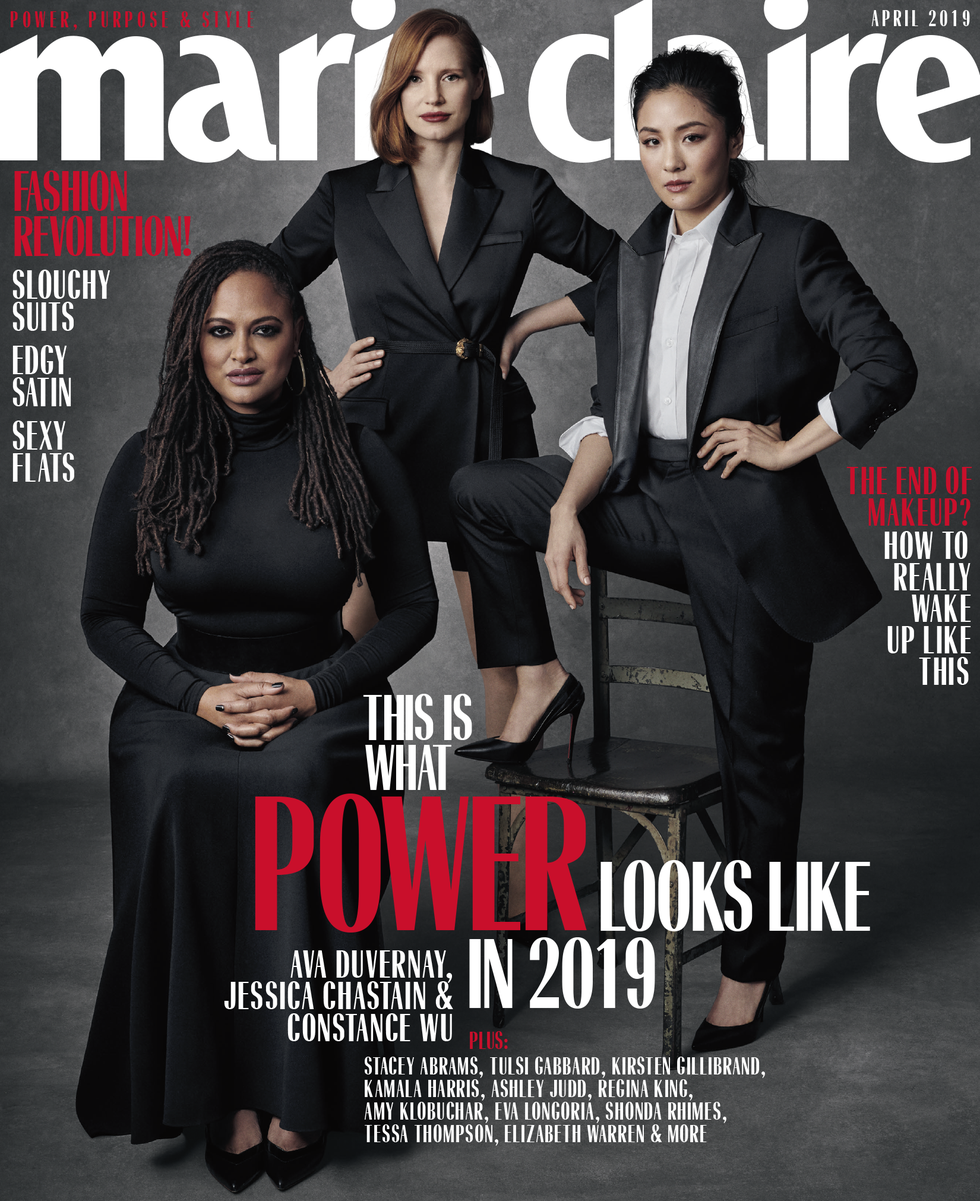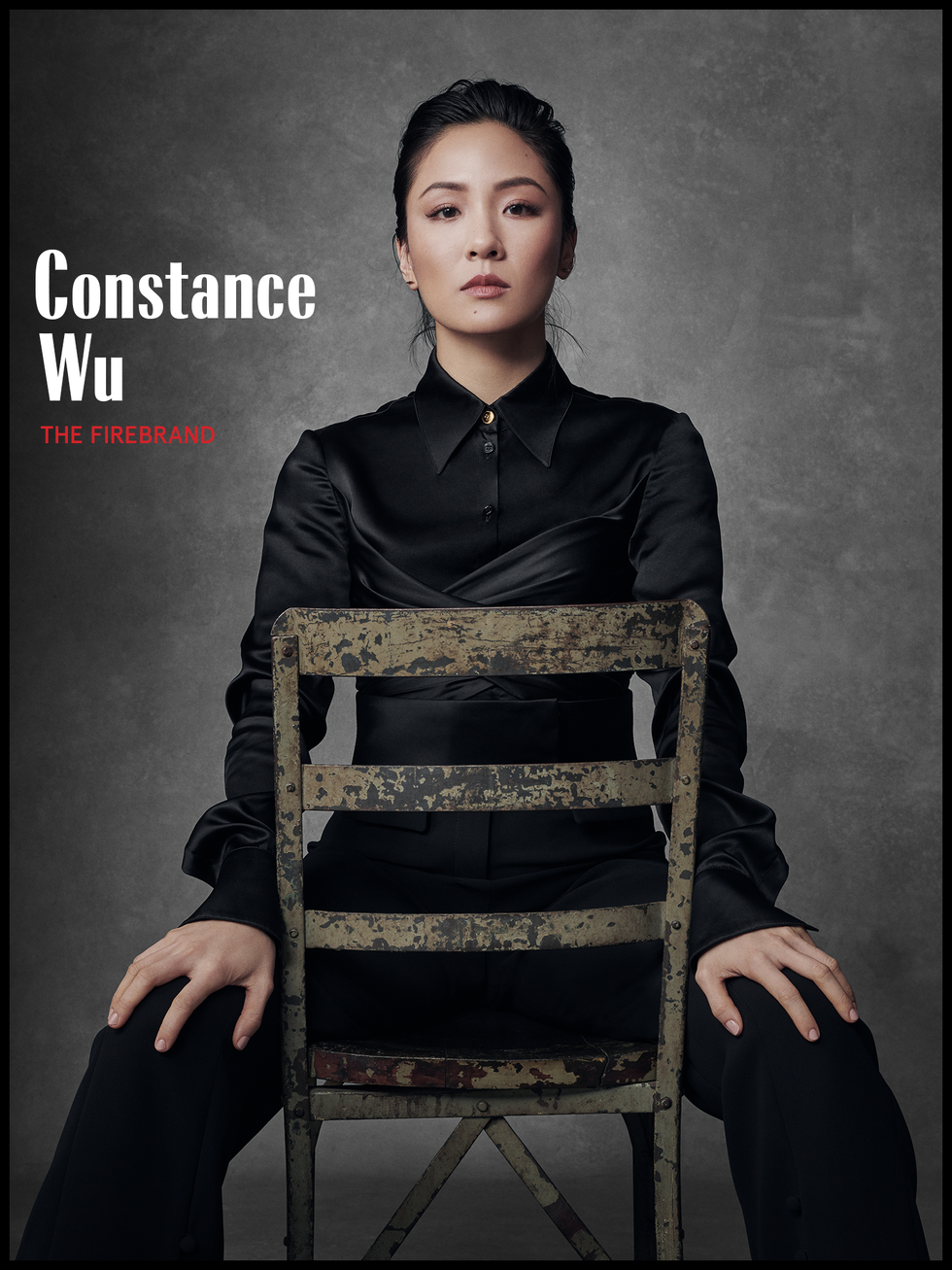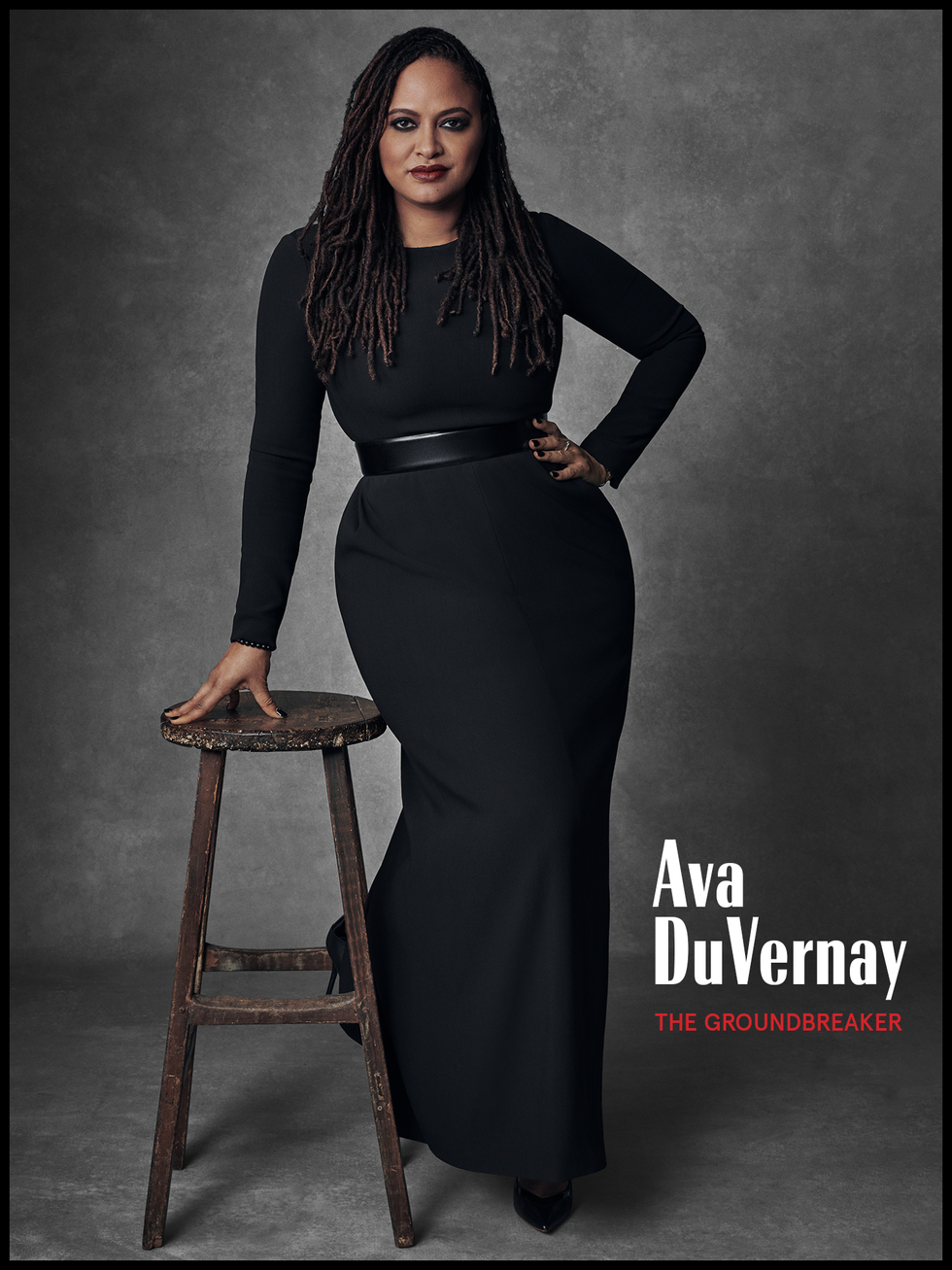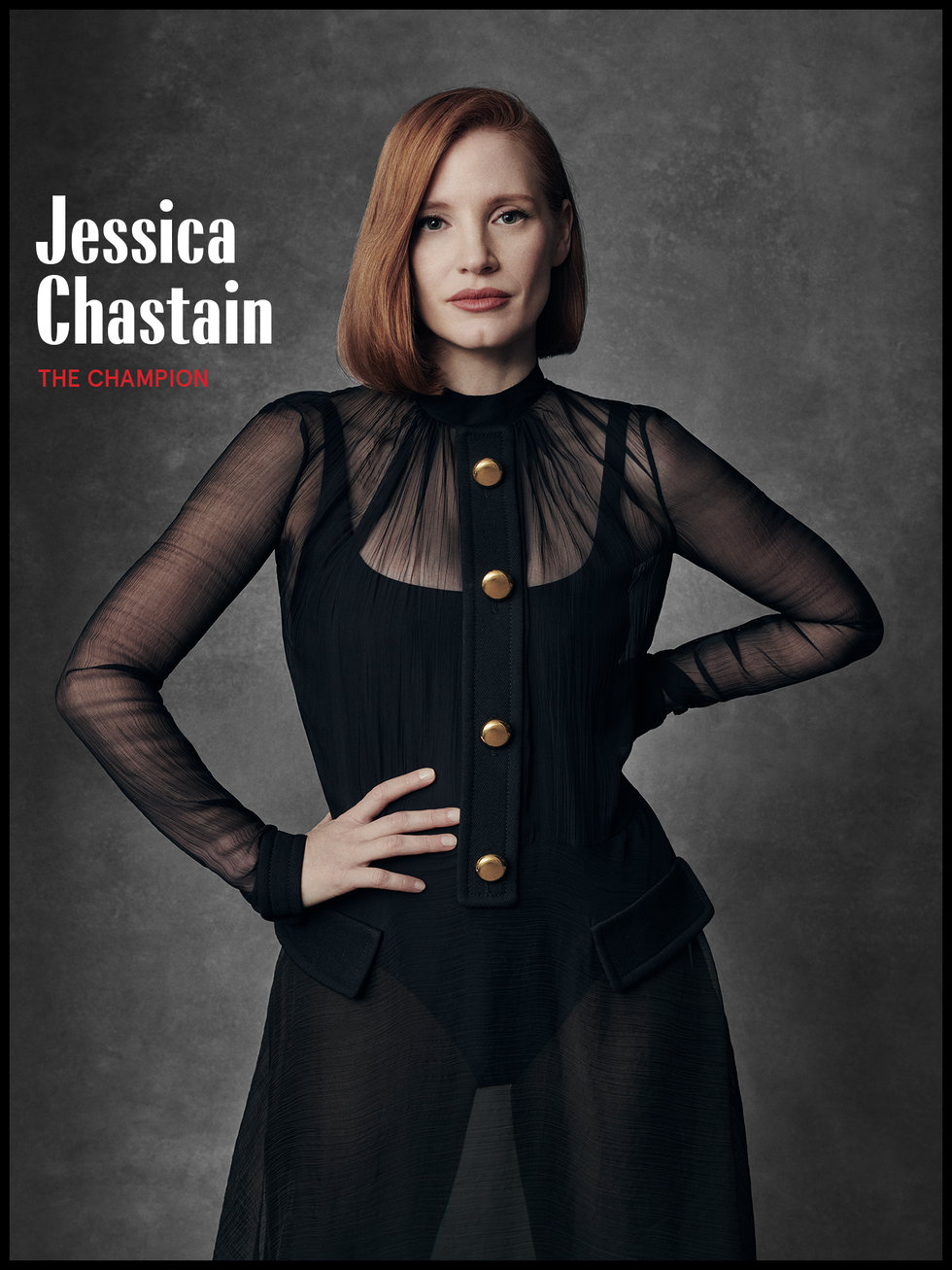The Change Makers: Constance Wu, Ava DuVernay, and Jessica Chastain
Inclusion. Representation. Diversity. Agency. Equality. On-screen and off-screen, these women are shaping the future of Hollywood.
A little over a year ago, as revelations of misbehavior by powerful men sparked a global reckoning, a group of women in entertainment came together to talk about what they could do to prevent abuse and ensure equity for working women.

DuVernay in Wolford top, The Row skirt, Max Mara belt, Malone Souliers shoes, and Jennifer Fisher jewelry; Chastain in Versace; Wu in Celine by Hedi Slimane and Christian Louboutin shoes.
The result was Time’s Up, an organization committed to building a world that insists on safe, fair, and dignified work for women of all kinds. What started in Hollywood has grown to a coalition of women spanning industries and geographies, with more women meeting and organizing every day.
Time’s Up Entertainment is now just one of the many affiliates working to solve industry-specific challenges, and the women involved are united in their unwavering commitment to keep fighting until their female peers have the opportunity to reach their full potential at work.
Here, some of the organization’s most engaged women share what inspired their participation, what keeps them motivated in their activism, and how they plan to create lasting change. Please read these stories, and join us on this journey at TimesUpNow.com.
—Nithya Raman, Executive Director of Time’s Up Entertainment

Versace top, Giorgio Armani pants, and Tacori earrings.
On set for the fifth season of her ABC sitcom, Fresh Off the Boat, Constance Wu is pondering Shakespeare. She’s trying to decide if she should do a play on her hiatus, and “Shakespeare in the Park has been my dream since I was, like, 16.”
The 37-year-old actress started in theater, building her career on stage in New York. “I never did comedies. It’s funny, people only know you by the first project that made you big, like Fresh Off the Boat or Crazy Rich Asians.” Wu calls the latter hit romantic comedy a huge highlight of her life, in no small part because it silenced generations of naysayers who’d insisted a film starring an Asian cast couldn’t succeed at that scale.
Get exclusive access to fashion and beauty trends, hot-off-the-press celebrity news, and more.
“Diversity isn’t just ‘Let’s have people of color supporting this white person’s story,’” Wu says, adding it’s a distinction she finds herself explaining repeatedly in Hollywood. During a meeting with a prominent studio executive a few years ago, “this guy started to school me, like, ‘I think it’s great that you’re speaking up about diversity, but it’s just the reality of the numbers, what movies people go see, blah, blah, blah.’ And I just looked at him and said, ‘I think you’re dumb.’”
People say women are inherently bitchy and competitive. But anybody will be competitive if there’s only one seat at the table.
Wu laughs loudly, conceding it may not have been “the best career move, but it was the best personal-values move.” As someone who’s tweeted about Hollywood’s white-savior complex, she couldn’t let it stand. “What he was saying was such bullshit. If you want to talk about whether or not an Asian person, or a person of color, or a trans person can open a studio movie, you can’t argue, ‘That’s not going to sell!’ because you’ve never done it before!” She takes a breath, then continues. “I think he thought because I’m a female actor and he’s super high-powered that I would try to make nice. But I don’t give a fuck.”
In fact, the older she gets, the fewer fucks Wu says she has left. She’s been advocating for representation as long as she has been in the business, selecting projects based on who is making them, her passion and insistence growing apace with her rising platform.
“People say women are inherently bitchy and competitive. But anybody will be competitive if there’s only one seat at the table,” she says, noting, “Most jobs I’ve taken since Fresh Off the Boat have all been directed by either women or directors of color. People who’ve had cultural bias prevent them from having opportunities. I hate this term ‘merit-based.’ We should all examine who decides what merit looks like and the racism and sexism built into that evaluation.”
That entrenched social conditioning is something Wu and her circle dissect in depth. One friend recently shared a story about how, when she was young, her father would assign her the role of secretary and her brother the role of president when they played make-believe. “Any time she opened her mouth, her dad would say, ‘Oh, the secretary is whining.’ And this is when she’s a kid.”
Wu knows the father didn’t mean any harm, but those roles and expectations get internalized. And before we know it, we’re telling ourselves “to shut our mouths and let the man do the talking. We move through the world that way.”
I’ve also learned that I’m really sensitive. People make assumptions that I’m not because I’m outspoken. But I’m outspoken because I’m sensitive.
She reflects on her younger self, when she felt more vulnerable, less able to foment change. “I used to do this thing [for auditions] where I would research the director, watch the movies he or she had done, and meld my performance to what I perceived to be that director’s preference.”
It’s a strategy she now views as “shitty” but illustrative. Wu knows no one benefits when you contort yourself into something you aren’t. “I’ve also learned that I’m really sensitive. People make assumptions that I’m not because I’m outspoken. But I’m outspoken because I’m sensitive.”
She falls quiet when asked if she sees signs that things are changing for the better. “Did you see this Gillette ad?” she finally says flatly, referencing the backlash to a razor campaign that called out toxic masculinity and had the audacity to suggest men be kinder. “All these defensive people arguing there is an assault on men in our culture—versus the amount who are supportive of us—is a real indicator of what our culture is passionate about.” Wu exhales and clarifies her position. She believes people can change, that listening matters more than arguing, that the #MeToo and Time’s Up movements are vital and enriching, that progress is inching along. But her frustration lingers: “The only way things get better is to demand that instead of us changing for the sake of how the culture has always been, let’s change the culture.” Her voice lifts, filling with fresh conviction. “And the fact that I have this tremendous luck and privilege? I intend to make good use of it.”

The Row dress, Max Mara belt, and Malone Souliers shoes.
Filmmaker Ava DuVernay prefers to keep her fingers in many pots. She makes big-screen fantasy epics (A Wrinkle in Time); smart, soapy television (Queen Sugar); Academy Award–nominated social-justice documentaries (13th); and profound civil-rights features (Selma), in addition to museum installations, music videos, animation, and shorts.
“It all works for me. I try to remain a generalist so that I can make a little bit of everything,” DuVernay, 46, explains. “You can’t really hit a moving target, so that’s my goal.”
She chuckles as she says the last bit, a throwback to a not-so-distant past when a then-32-year-old DuVernay was running her own PR firm and independently making films with no expectation that her art would garner any more attention than the gifted black women filmmakers who had come before her and been largely ignored.
“I didn’t have any dreams or designs that a studio would want to make my work, that any awards body or critical community would embrace my work.” DuVernay chose to use this bias as an asset: “In many ways, that lack of attention put me in a really good place. No one’s going to watch it anyway, so I may as well make what I want.”
I don’t feel bound to the budgets, to the awards, to the critics. If I’m happy with it, then what happens around it is really not up to me.
DuVernay’s unfettered vision has since made history. She’s the highest-grossing female black director in domestic-box-office history and the first black woman to direct a film nominated for a Best Picture Oscar; she also has been nominated for a Golden Globe and Best Documentary Feature Oscar and signed a $100 million deal (with Warner Bros. Television). She’s currently editing a limited series for Netflix she wrote and directed based on the Central Park Five jogger case (premiering in May), in addition to starting preproduction on a Prince documentary, as well as “a bunch of other projects that haven’t yet been announced.” Like she did in the beginning of her career, DuVernay makes her creative choices based on what she believes is worth her time, not what others expect.
“I don’t feel bound to the budgets, to the awards, to the critics. If I’m happy with it, then what happens around it is really not up to me. The more you try to control, the more you get turned around. You have to know where you stand and be your own compass.”
As for our current cultural compass, DuVernay, who was recently named cochair of Prada’s Diversity and Inclusion Advisory Council, takes the long view. “Whenever we get depressed or down,” she says, “we need to look to history and realize that while it feels very alarming and uncharted, the kind of straight-up racism that we hear now is not new.”
She brings up Julie Dash, who directed 1991’s seminal, breathtaking Daughters of the Dust, the first feature directed by an African American woman to get a general theatrical release, but whose career stagnated nonetheless. (DuVernay has since corrected this injustice by bringing Dash, 66, to several Hollywood events, landing her back in the mix for director gigs, and even hiring her to helm episodes of Queen Sugar.) DuVernay, like Dash, like so many women who’ve been relegated to back corners and hushed tones, refuses to be erased.
“It’s happened before, and we’re here, standing and continuing forward. We continue to find beauty, we continue to triumph, we continue to live and love and do all kinds of things that the people who are against us would rather we not do.” DuVernay evokes her grandmother’s oppressive daily reality. “The fact that I can go into a restaurant and be served—this is something that wasn’t a reality two generations ago. Sometimes I want to say to folks, ‘Get a grip. Buck up and really look at where we’ve been, look at where others are, and keep stepping forward.’”
I allowed someone to put their name on my work. I hate it every day, and I don’t think I’ll ever be able to let it go, but it definitely taught me some lessons that I intend to benefit from.
For her that means, among other things, “consistently working as a black woman filmmaker in a space that is not very welcoming to black women filmmakers.” She offers an example from her life, when she felt pressured to forgo her writing credit on Selma. “It was my biggest career mistake so far. I allowed someone to put their name on my work. I hate it every day, and I don’t think I’ll ever be able to let it go, but it definitely taught me some lessons that I intend to benefit from.”
She admits, somewhat sheepishly, that despite the battles lost and left to fight, she is entering a period of contentment. “I believe our life is in seasons. Right now, I feel good, I feel on solid ground, I know where I’m going, I know what I want to do, and I know how to do it.” That is, telling her stories as truthfully and muscularly and in as many forms as she can. After which she will “sit in the satisfaction of that, and whatever else comes is what comes.”

Prada dress and Alix NYC bodysuit.
“We’re going on a journey, you and I,” Jessica Chastain says excitedly over the phone as she pulls her car door shut. “I’m taking you on a bunch of errands with me. Grocery shopping, picking up mail, hardware store. Let’s do it!”
Infectious enthusiasm for quotidian domestic chores is not exactly what one would expect from Academy Award–nominated actress, producer, and activist Chastain, who has made a career playing knotty, complicated women—“To me, there’s no such thing as the angel or the good wife or the perfect mother”—a vein she will again mine when she joins the casts of X-Men in Dark Phoenix (out in June) and It: Chapter Two (September) and when she stars as Tammy Wynette in the upcoming biopic George and Tammy.
On the drive to the hardware store, Chastain, 42, reflects on the highs of her past year, listing Time’s Up and the record number of women being elected into office as buoying her optimism, noting, “The public has answered back in a resounding, hopeful way that change is possible and we’re not going to be dictated to by bullies.”
Though heartened that women are refusing to accept “an old-fashioned model of power,” Chastain remains pragmatic, pointing out that no social movement survives without concrete shifts in economic equality (“If you’re not paid the same, you have to work all the time”) and the promotion of women into seats of actual authority. For her part, she’s making sure her projects don’t just reflect different demographics but also deal a fair hand to all parties.
The public has answered back in a resounding, hopeful way that change is possible and we’re not going to be dictated to by bullies.
Her all-woman production company, Freckle Films, focuses on untold stories and women-led casts, as well as a commitment to equal pay, most recently with the spy thriller 355 (which starts filming this summer), where she sidestepped the studio system, independently raising more than $80 million, and insisted all five lead actresses—Chastain, Lupita Nyong’o, Penélope Cruz, Marion Cotillard, and Bing-bing Fan—earn the same fee and hold equity in the film. (Last year, she helped Octavia Spencer quintuple her salary on a comedy they sold by tying Spencer’s deal to hers.)
“I’ve had people tell me, ‘You need to be a little more quiet with all this woman talk,’” Chastain admits, laughing, adding she has no interest in perpetuating damaging sexist tropes about what women should be and do, on- or off-screen. Her dedication to leveling the field extends to crew and head-of-department hires, adjustments that have real-world implications and puncture the oft-repeated lie that filling those jobs with women is “too hard.”
“I agree there are not as many women as men that have the same experience, but that’s because, in the past, women have been actively discriminated against. Male directors who had their first film in Sundance, their next offer is a huge action movie. Women haven’t been given those opportunities, and we need to ask why.”
She goes on to talk about her most recent empowerment epiphany, as she was surrounded by the 355 cast at Cannes last May. “I remember us all holding hands, walking through this crowd of people, this incredible moment of solidarity, and one of the girls whispered, ‘The power of women,’ and I was like, Ohhhh. I realized, wait a minute, we’re the ones who are actually in charge here.”
Along with her political evolution has come a personal one. Chastain quit being a pleaser, realizing her time and energy are currency she should spend more wisely. “I used to be so obsessed with wanting to accommodate others. Like, in the beginning of my career, when I had ideas about my character or a scene, I felt like I had to go through the male actors. I’d go to them and say, ‘Ooooh, what are we going to do?’ And they’d say, ‘Don’t worry. I’ll take care of it.’ They would go to the director and the director would take them seriously.”
Chastain sighs. “I wish I could’ve just bypassed all of that.”
She bypasses it now, working only with people who understand she has no intention of couching her voice or opinions. Still, she wonders what would have happened had she begun advocating for herself sooner.
“When I look back, there are moments when I’m like, ugh,” she says, launching into a story about a male producer who grew hostile and aggressive when she didn’t return his flirtations. “For months, I tried to make it light, laugh it off. Now I wish I had just told him to fuck off.”
I learned it’s impossible to make everybody happy. At the end of the day, just do stuff that you’re proud of and don’t be an asshole.
When asked how she freed herself from the approval matrix, Chastain pauses a beat.
“That’s a hard question because I don’t know that it was even something that I was aware of until I stopped doing it. All of a sudden, I realized, I feel really happy. Why is that? And it was because I was caring less about what others think of me.”
Now she’s concentrating on what she can control, generating work that lifts others and finding creative fuel in everything from long, solitary walks in the countryside to brainstorming inventions for Shark Tank.
“I learned it’s impossible to make everybody happy. At the end of the day, just do stuff that you’re proud of and don’t be an asshole.”
It’s a journey she’s happy to take.
Introducing Marie Claire's full roster of 2019 Change Makers:
This article originally appears in the April 2019 issue of Marie Claire.